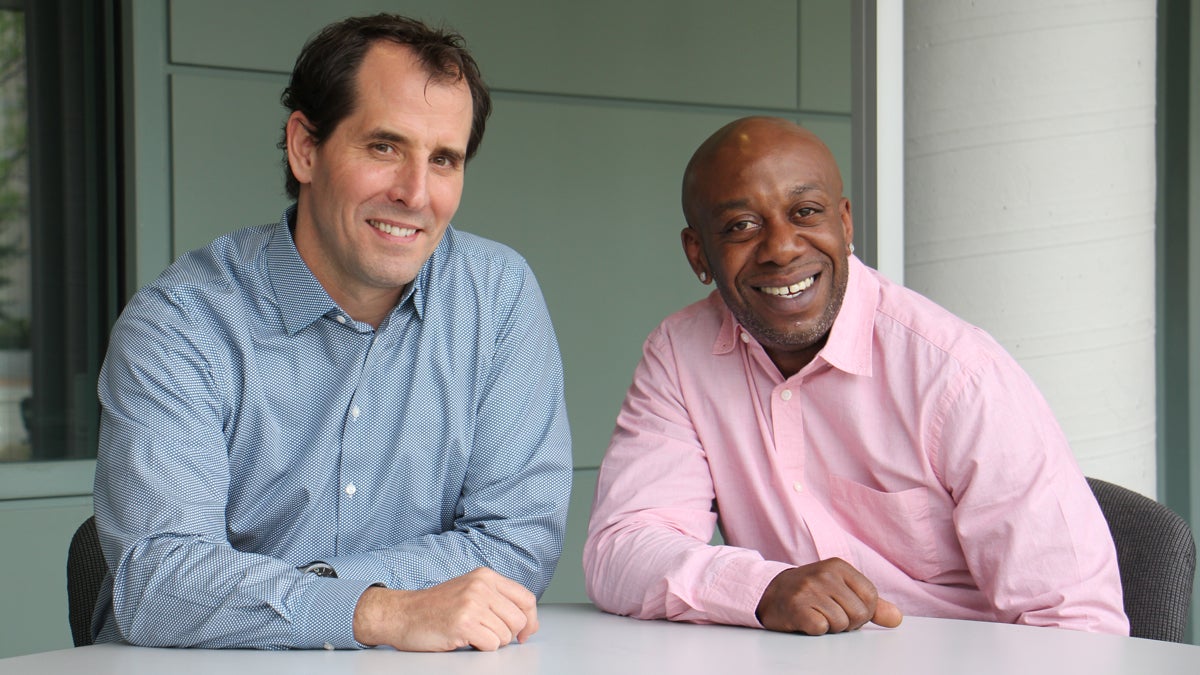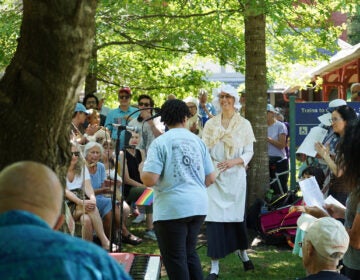No skills tests, no background checks, just a life-saving job at a bakery

Mike Brady (left), CEO of Greyston Bakery and one of his employees, Dion Drew. (Emma Lee/WHYY)
When Mike Brady became chief executive of Greyston Bakery in 2012, he had many “good” ideas about how to help the employees with criminal records who constitute most of the workforce at the Yonkers, N.Y., company.
“I came in wanting to do a lot of support programs,” maybe budgeting or professional attire, Brady said.
“But you know what the employees really liked? They liked when I bought a new $400,000 mixer and fixed the factory floor, when I made capital improvements to the plant,” he said. “To them, it said, ‘Mike believes in this business, and he believes in us.’ “
Brady doesn’t need to make a business case for his bakery’s “open hiring” process — although he can, readily, since Greyston’s 100 employees bring in $20 million in revenues and supply brownies and cookies to Ben & Jerry’s and Whole Foods.
Brady’s employees make the case for him.
“We’re trying to show the world it’s all right to hire someone who was incarcerated,” said Dion Drew, 39, a bakery trainer who spent four years in prison on drug charges before joining Greyston in 2009.That was Brady’s message Wednesday in Philadelphia, where he spoke at the Conscious Capitalism conference, a gathering of 350 business leaders who believe in elevating humanity through business. The conference ends Thursday.
“There’s no skills test, no background check, no interview, no reference checks,” Brady said. People who want jobs put their names on a list. They can have criminal records or be homeless or be among the long-term unemployed, the mentally ill, or the disabled.
When there are openings, they get a call, usually in four months, Brady said.
Open hiring was developed by Roshi Bernie Glassman, a Zen master who founded Greyston Bakery believing that employment would lift people out of poverty. “He was not concerned with what people had done in the past,” Brady said, “but only concerned about what they can do in the future.”
Open hiring wouldn’t work for many complicated jobs, Brady said, but most companies have at least one position that could be filled that way.
At Greyston, new hires must be able to “receive a pan of brownies and put them in the oven and put them in a box,” Brady said.
“You need to show up on time,” he said. “You need to listen to your manager. You need to follow our high standards.
“It’s not a program,” he said. “It’s a business. I need to get those brownies out of the door, and if you aren’t able to help me to do it, then we’re going to ask you to leave.”
Employees start near minimum wage but get bonuses within two months and again when they complete apprenticeships. Next, they join the bakery workers’ union. Only six in 10 make it that far, Brady said.
The jobs come with benefits. Employees can get subsidized child care organized by a related nonprofit, the Greyston Foundation, which also developed low-income housing. People with addictions who mention them during orientation get rehab help. If they show up high, they are fired. Open hiring hasn’t made any difference in internal theft or more expensive insurance, Brady said.
The business case comes in two places, he said: recruiting and marketing.
The Society of Human Resource Management, a professional organization, estimates that it costs an average of $4,129 in advertising, background checks, agency fees, and staff to recruit one employee. For Greyston, it’s the minor expense of maintaining a list. And because the bakery hires 10 at a time, orientation costs are spread out.
“We put that money into social services and training,” Brady said. “I don’t know what my team members’ backgrounds are, but I’d like them to explain what their problem is and allow me to help overcome it.” Over time, he said, Greyston’s human-resources department has connected with social-service agencies, making each problem easier to solve.
“We don’t reinvent the wheel,” he said.
As for marketing, bottom-line considerations – quality and price – win contracts, Brady said.But the intriguing nature of Greyston’s mission opens doors for meetings, helps online marketing for corporate gifts, and attracts investors and donors to the related foundation, Brady said.
“Baking is a commodity product, so if I can differentiate by having a great social-justice mission, then I can compete more successfully,” he said.
Ben & Jerry’s customers may appreciate a supplier with a social mission. But, Brady said, “their procurement specialists aren’t social-justice people. They get paid to negotiate a good price.”
This piece was produced by the Inquirer, the Daily News, Philly.com and WHYY/NewsWorks for The Reentry Project, a citywide collaborative news initiative on the challenges facing people returning from prison, and what can be done about them.
WHYY is your source for fact-based, in-depth journalism and information. As a nonprofit organization, we rely on financial support from readers like you. Please give today.




